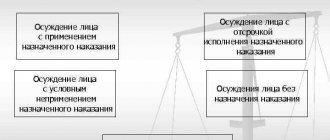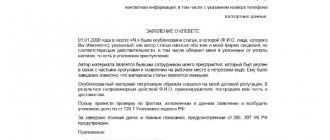Each of us has our own attitude towards religion and rituals, and the attitude towards other opinions on this issue should be respectful. Russia is a multinational country, where people freely exercise their constitutional right to freedom of religion.
The Constitution of the Russian Federation establishes a ban on persecution on religious grounds, which is typical for any civilized state. Therefore, any blasphemy towards any religion is unacceptable and entails responsibility. We will talk about this in our article.
What is extremism under the law?
In the Federal Law “On Combating Extremist Activities” No. 114, extremist activity is defined as such activity in which attempts are made to publicly justify terrorism, change the foundations of the constitutional system, and incite discord in public - social, religious, racial; promote the exclusivity or inferiority of people based on their belonging to some nationality, religion, or language.
Actions are also called extremist when obstacles are created to the work of government agencies, election commissions, and associations - public and religious; when the crimes specified in Article 63 of the Criminal Code are committed, in paragraph “e” of its first part; Nazi symbols are displayed.
False accusations of government officials of extremist activities while working in public office are also considered extremism
If a citizen finances the listed actions or helps to carry them out in some other form, he can also be accused of extremism.
Latest amendments
In 2016, as part of the state policy of strengthening counter-terrorism, Russia adopted Federal Law-374, which supplemented Article 5.26 of the Code of Administrative Offenses of the Russian Federation with parts 3, 4 and 5:
3. Any religious organization, carrying out its activities, is obliged to indicate its full official name in the labeling of materials distributed within the framework of preaching activities. In particular, this applies to books, brochures, photographs, video and audio materials. If the name is missing, not specified in full, or is deliberately false, the organization faces:
- An administrative fine ranging from 30 to 50 thousand rubles with the confiscation of the listed information materials.
4. Violation of legal requirements for the implementation of missionary activities threatens the violator with an administrative fine. These requirements are spelled out in Articles 24.1 and 24.2 of the Federal Law of 1997 N 125 “On Freedom of Conscience and Religious Associations”. The fine is:
- From 5 to 50 thousand rubles. for ordinary Russians;
- From 50 to 100 thousand rubles. — for organizations (legal entities).
5. If, in the process of carrying out missionary activity, violations were committed by a citizen of another state or a stateless person, he faces:
- Administrative fine from 30 to 50 thousand rubles;
- The person may also be deported from Russia.
How does the law define insulting the feelings of believers?
By insulting the feelings of believers, Article 148 of the Criminal Code of the Russian Federation refers to actions that are made publicly and are aimed at offending the feelings of believers, as well as expressing open disrespect for other people.
The Moscow Patriarchate explains the concept of “religious feelings” as a reverent attitude towards shrines, texts, personalities of saints, places of pilgrimage, objects and images. If such feelings are insulted, pictures or words convey
- negative attitudes;
- offensive characteristics;
- negative emotions.
This may be a review expressed with disrespect for shrines, texts and other things important to a believer. It is also considered an insult to mock religious symbols, for example in the form of a caricature. If someone deliberately spoils religious books and objects, this is also an insult.
It is interesting that the law does not provide a list of religions and criteria by which one can determine which faith a particular person belongs to. That is, any person who declares that he is committed to some kind of religious movement can call himself a believer.
At the same time, it is necessary to prove that words and actions that offend the feelings of a believer were said or done precisely in order to offend him, that is, not by accident.
As you can see, the definitions are quite vague. The law, as legislators themselves say, needs to be improved. In the meantime, it gives many options for interpretation, and accordingly, anyone who makes any public statements and actions that could be regarded as such runs the risk of finding themselves accused in a case of extremism or insulting the feelings of believers.
Judicial practice in 2022
Art. 148 of the Criminal Code of the Russian Federation began to be actively used in 2014. There are quite a lot of examples of its application. Let's look at the more interesting of them.
Here are some illustrations of the direct effect of the new criminal article:
- Publishing a picture on the Internet relating to the Muslim religion cost a resident of Izhevsk 200 hours of compulsory work;
- Installing a scarecrow with an offensive inscription on a worship cross for residents of the Kirov region cost 230 hours of mandatory work;
- Hitting a Buddha monument and emptying his bladder on it cost a Dagestani citizen 2 years of probation;
- Catching Pokemon in the temple cost the convicted Ruslan Sokolovsky 3.5 years of suspended imprisonment;
- The publication of an article by an Orenburg medical university teacher entitled “Evil Christ” cost him 35 thousand rubles as a fine.
In general, the introduction of this article served as a response to the actions of the notorious group Pussy Riot, which caused chaos in the Cathedral of Christ the Savior. The group members, by the way, were punished for hooliganism motivated by religious hatred and received a prison term of 2 years each. Although they were sent to prison, they were later granted amnesty.
Recently there was also an incident on religious grounds. In 2022, a girl in the city of Magnitogorsk, Chelyabinsk region, posted a photo on the Internet showing how she lit cigarettes from an altar filled with burning candles in an Orthodox church in the city. Based on the results of the consideration of the case, a fine was imposed, which her parents will have to pay. Later, the teenager admitted that she was trying to “hype” in this way, not thinking of offending the feelings of Orthodox believers.
Russia is a secular state in which religion is separated from the state and is an independently functioning system. But at the same time, religion and the feelings of believers are protected and defended by the current political authorities, regardless of the type of religion itself.
In order to protect public safety and order, to protect the rights guaranteed by the Constitution of the Russian Federation, outrage against religious beliefs and organizations in the country has been recognized as a criminal offense since 2013.
Why does the law prohibit extremism?
The task of the law in this situation is to ensure equality of people of all races, religions, and nationalities. Legislative acts that prohibit the dissemination of extremist information and the commission of similar actions exist not only in Russia, but also in other states.
This is necessary so that there is no hostility between representatives of different nationalities and social groups, so that someone does not decide that he is better or superior to another - and on this basis does not begin to oppress people who differ from him in skin color or religious preferences. This is a matter of public safety.
Protection of religious beliefs under the Constitution
Basic information is contained in Art. 28 of the Constitution, since it guarantees freedom of religion for all Russians. No one can influence a person when choosing a religion, or impose their own opinion on this issue.
Free legal consultation
+8 800 100-61-94
A person can not only adhere to certain worldviews and religious beliefs, but also independently change his faith when a desire or need arises . The possibility of even abandoning a previously chosen religion is offered. There are no penalties for such actions, so there are no negative consequences.
Attention! Violators of the law are usually fanatics and representatives of different religious denominations, who try in different ways to retain followers, therefore they often threaten and blackmail people, and also use moral and physical violence, which is considered a criminal offense.
What does the law prohibit in Russia?
If we turn to the law, it is prohibited in our country
- express in public or disseminate on the Internet, as well as in the media, calls to overthrow the government or change the constitutional system;
- prevent other citizens from voting;
- talk about the need to hate someone because of their religion, occupation or place of birth, and also call to harm them;
- publicly display Nazi symbols in any way;
- speak out publicly in defense of terrorism and help terrorists;
- publicly express ridicule about the religious feelings of other people, symbols, shrines, images related to any religion; Pictures containing such ridicule cannot be distributed on the Internet, including reposting them.
This is just a brief summary of what the court may consider extremist actions and insult to the feelings of religious people. Note that the common point in all this information is that all actions are performed publicly. That is, it is for public display that one can end up in the dock.
Memes and a scarecrow from the cross in Kirov
In July 2022, the Omutninsky District Magistrate Court found a 21-year-old local resident guilty of insulting the feelings of believers and fined him 25 thousand rubles.
As the regional prosecutor's office told 7x7, the young man posted drawings and inscriptions on his VKontakte page that insult Christians and clergy. The prosecutor's office could not clarify what exactly was written and drawn. In June 2016, two residents of the Vyatskopolyansky district of the Kirov region were sentenced to compulsory labor for making a stuffed animal out of a worship cross. According to the investigation, the men specifically agreed to desecrate the worship cross at the entrance to the village of Staraya Malinovka, Vyatskopolyansky district, Kirov region. On the night of September 22-23, 2015, they brought with them pants, a jacket, ropes, a hat, a mask and self-tapping screws in order to make a stuffed animal out of the cross. They hung an insulting inscription on the cross. The investigation found that the men disdained the Orthodox faith and pursued the goal of desecrating a religious shrine revered by believers. The indictment documents also include the concept of “mental pain” that the convicts caused to believers by their actions.
Internet is a public place
And since the Internet is a public place, everything that is published on the World Wide Web can be considered public speech. Accordingly, it falls under the law.
If you just wrote a small post in your group that you share with friends, this is a public speech. After all, other people can see your message.
Even if there is a chance that only one person will see it, you are taking a risk. According to the law, incitement to hatred and extremism can be considered even in relation to one person. And this person could be, for example, an investigator.
Moreover, the law does not care who is the author of the post - you yourself or someone else. From the point of view of legislation, reposting recordings, videos, pictures is also the distribution of materials promoting extremism or insulting the feelings of believers.
The corpus delicti under Art. 148 of the Criminal Code of the Russian Federation
What is insulting the feelings of believers? This is primarily a violation of Art. 28 of the Constitution of the Russian Federation, according to which, every person is guaranteed freedom of conscience, including the right to individually or collectively profess any religion, not profess any religion, freely disseminate it and act in accordance with their religious beliefs.
The elements of a criminal act are represented by the following set of legal facts:
- The object of the crime is freedom of religion, the rights guaranteed by the Constitution.
- The objective side of the crime involves unlawful obstruction of the activities of a religious organization or the performance of a religious ceremony. Such actions can occur in a wide variety of forms: refusal to register a religious organization, damage to its property, threats of violence, or attempts to force a person to renounce his religion.
- A sane person aged 16 years can be recognized as a subject.
- The subjective side is represented by direct intent. The perpetrator not only commits hooligan acts against specific individuals, he carries them out within the framework of a religious context.
The crime is considered completed regardless of whether the illegal actions led to disruption of the activities of the religious organization or not.
To constitute a crime, it must extend to the activities of an officially registered religious organization. This means that it must have the status of a legal entity.
If the obstruction occurs in relation to unregistered organizations or totalitarian sects, this will not be qualified under Art. 148 of the Criminal Code of the Russian Federation.
Who decides whether a message, video or picture is extremist?
For this purpose, an examination is carried out and competent specialists are invited. They use special techniques that have been approved by the Ministry of Justice. But since there is no exact list of criteria by which information is assessed, a subjective factor intervenes in the process - and it is impossible to predict the result of the examination. For example, an examination in the case of Maria Motuznaya, who was accused of insulting religious feelings, found that out of 13 pictures, only three offended the feelings of believers.
To understand which pictures, videos and messages on the World Wide Web may be considered extremist by Russian law enforcement agencies, it is worth familiarizing yourself with the official list of extremist materials that are published on the Ministry of Justice website. Now it has several thousand positions. You can see leaflets, films, songs, pictures, comments, books and brochures. Some examples seem harmless, for example, “kick them out so and so because it’s all their fault.” In this case, the author refers to local authorities. Such a statement was regarded as extremist.
Consideration of the application
According to the provisions of Art. 144 of the Code of Criminal Procedure of the Russian Federation, an application for an offense must be considered within three days from the date of registration. As a result of the consideration, the investigative authorities make a decision to initiate a criminal case or refuse.
Please note that the police do not accept anonymous complaints. In order for the application to be treated carefully, it is advisable to immediately provide evidence of the crime or indicate the contacts of witnesses. After the initiation of a criminal case, investigative actions begin
The final decision is made by the criminal court during the hearing. The administrative composition of the offense is considered in the magistrate's court
After the initiation of a criminal case, investigative actions begin. The final decision is made by the criminal court during the hearing. The administrative composition of the offense is considered in the magistrate's court.
The offense of protecting the rights of believers is not always easy to qualify as a crime. To prove the fact of insult to religious feelings, religious and cultural studies are often appointed. If offensive statements were published on the Internet or in print, a linguistic examination is carried out.
The refusal to initiate a criminal case can be appealed to the prosecutor's office.
What about freedom of speech?
Freedom of speech also has its limitations - in the form of the law. If someone's actions or words violate the law, this is no longer freedom of speech, but a violation of the rights of other people. It is unlikely that anyone would think of coming and settling in any house just because he liked it, although the right to housing is guaranteed to all citizens of our country.
The same is true with freedom of speech as enshrined in the Constitution. No one is forbidden to write about their opinion, for example, about what the world received as a result of the Second World War, based on facts and without offending anyone. But publishing the symbols of the Third Reich on your page is prohibited by law, this is no longer freedom of speech.
By the way, it is possible to criticize the government, politicians and religious organizations within reasonable limits and without insults in Russia. And this is confirmed by the Resolution of the Plenum of the Supreme Court (points seven and eight) dated November 3, 2016 N 41 “On amendments to the resolutions of the Plenum of the Supreme Court of the Russian Federation dated February 9, 2012 N 1 “On some issues of judicial practice in criminal cases of crimes of a terrorist nature " and dated June 28, 2011 No. 11 "On judicial practice in criminal cases involving crimes of an extremist nature." The main thing that distinguishes such criticism from extremism is the absence of attempts to convince anyone of the need to hate people who belong to any religion or nationality, or to a political party. You can express your personal opinion publicly, but it should not contain dangerous propaganda or calls.
Punishments in other countries
Abroad they also believe that insulting believers is a crime. Punishments for such actions are especially severe in Muslim countries. Thus, in Afghanistan, Iran, Nigeria, Saudi Arabia, Jordan and some other states living under Sharia law, the laws provide for penalties for sacrilege, including the death penalty.
Blasphemy is punished quite severely in Algeria, Indonesia, Sudan, and Pakistan.
A blasphemer can get away with a small prison sentence or a fine in Brazil, Greece, Israel, India, Turkey, Spain, Italy, Malta, the Netherlands, and Poland.
Without specifying the type of punishment, the law prohibits blasphemy, sacrilege and similar actions in Bangladesh, Denmark, Egypt, and Ireland.
It is not a punishable offense in Australia, Iceland, etc.
Some European countries have introduced the legal concept of “insulting religion,” which is criminally or administratively punishable in almost all countries of the continent.
What can they be charged for?
There are many reasons for holding people accountable for disseminating information on the Internet that calls for extremism or insulting the feelings of believers. They can be divided into two main groups.
- Any publications that contain extremist statements and images: comments, videos, reposts, a photo that the user has saved on his page and is available for viewing by other people.
- Participation in a community that publishes such materials, including even if it has not yet published or done anything, but is only discussing its plans to commit such actions.
Detailed analysis
In 2015, according to statistics, more than 700 people were prosecuted in Russia for distributing materials that contained extremist calls and insulted the feelings of believers on the Internet.
In November 2016, the Plenum of the Supreme Court of the Russian Federation adopted Resolution No. 41, which requires courts to understand situations in detail before passing sentences. Now, when a court decides whether a defendant's actions were intended to incite hatred or enmity or to degrade a person or group of people, it must rely on the totality of the circumstances and take into account many factors, including context and form.
According to experienced lawyers, this means that, according to the law, the court can now hold an Internet user accountable for disseminating extremist information only after thoroughly checking and analyzing a lot of information, including correspondence and comments.
Journalistic investigations and prison terms for personal data of security forces
Article:
320 of the Criminal Code (disclosure of information about security measures)
Changes made:
in June 2022
The law was adopted:
in 4 months
How the article changed
In March 2022, the Anti-Corruption Foundation published an investigation, “He’s Not Your Dimon.” It was about corruption schemes, in which Prime Minister Dmitry Medvedev may have been involved. The investigation was followed by large protests across the country.
They tried to block the film more than once in court, but it is still available on YouTube - the video now has almost 44 million views. Already in July 2017, the State Duma introduced amendments to the law “On State Security”. The Federal Security Service received the right to protect the personal data of officials and their families; Processing of this data is now possible only with the personal consent of people under state protection.
“The amendments mean that from all public registers - traffic police, Rosreestr, Unified State Register of Legal Entities, FSSP, Federal Tax Service, etc. - any information about the president, prime minister, prosecutor general, chairmen of the Investigative Committee, both houses of parliament, the Supreme and Constitutional ships and their family members. At the legislative level, there is no definition of a family member, which means that the law can be applied arbitrarily, excluding information from public registers even about cousins of high-ranking officials,” explained Ilya Shumanov, General Director of Transparency International Russia.
The law has significantly complicated anti-corruption investigations—more and more often, journalists come across the faceless “Russian Federation” where the name of the property owner should be—but the restriction of access to information about security forces and officials did not end there.
Three years later, on December 14, 2020, journalists from several publications published an investigation in which they named the people allegedly behind the poisoning of Alexei Navalny. Journalists are confident that eight employees of a secret unit working under the guise of the FSB Institute of Forensic Science were involved in the poisoning.
Already on December 22, the State Duma adopted a bill allowing to hide the personal data of security forces, judges, prosecutors and their relatives. Previously, the law allowed hiding data only in cases where there was a real threat to the life and property of officials. “Currently, the practice of unauthorized publication in information and telecommunication networks of information about facts, events and circumstances of the private life of law enforcement officers, regulatory authorities, and military personnel is expanding, which negatively affects the exercise of their powers,” stated the explanatory note to the bill.
The president signed a law tightening liability for the disclosure of personal data of security forces and their relatives in June 2022. Amendments were made to Article 320 of the Criminal Code. From the new version of the article, the indication that the disclosure must be made “for the purpose of impeding official activities” has disappeared. “The purpose of such actions is often not to impede the official activities of law enforcement officers, but other aspirations (self-interest, revenge, PR, etc.),” believe the authors of the bill. Now for “other aspirations” you can receive up to 480 hours of compulsory labor, and if they entail “grave consequences” - up to 5 years in prison.
In July 2022, the president signed another law on blocking information - Roskomnadzor received the right, without a court decision, to block information that the state considers unreliable.
The Center for the Protection of Media Rights noted that these amendments “kill journalistic, blogger and public investigations at the root.” As the director of the center, Galina Arapova, explained, they make it possible to delete even old investigations:
“A person just needs to write a statement to the prosecutor’s office with the words “in this material they wrote that I am a corrupt official, although I have not been convicted of any criminal charges for corruption.” The prosecutor will have to check this information within ten days, and evaluate only the evidence that was provided to him by the “offended party.” <…> If the editors refuse to delete the investigation, the page with it or the entire site may be blocked. So now, if you wish, it will be possible to completely clean up all the investigations on the Internet for which none [of those involved] was brought to justice.”
What punishment can follow for extremism and insulting the feelings of believers on the Internet?
According to the law, there are three types of liability for extremism in Russia.
- Administrative, that is, a fine. For example, propaganda of Nazi symbols or their publication can lead to a fine of 2 thousand rubles or to arrest for 15 days. If extremist materials included in the list of the Ministry of Justice are distributed on a mass scale, they are fined 3 thousand rubles or placed under administrative arrest. This means that you can get a fine for reposting such materials.
- Criminal liability for extremism is provided mainly by Article 282 of the Criminal Code (note 2), as well as Article 63 of the Criminal Code (clause “e” of Part 1). There are other articles under which people are imprisoned for reposting: 205.2 (on public propaganda or justification of terrorist actions), 280 of the Criminal Code ( on public calls to commit extremist actions, which contain the words “do”, “it’s high time to do” and similar statements); 280.1 of the Criminal Code (about calls to secede from Russia - public). The criminal sentence that can be obtained under these articles is up to seven years in prison. Criminal liability is also provided for insulting the feelings of believers: Article 148 of the Criminal Code was introduced in 2013 after an incident in one of the churches in Moscow. Now prosecution is possible even without inciting hostility and without public calls for illegal actions, and without humiliating the dignity of any social group.
- Civil law, when moral or material damage is compensated. For example, someone reposted a picture that caused moral suffering to another person: this is a reason to go to court. sue for insult for a comment about the work of some specialist, where he is accused of something unreasonably.
Case studies
Here are a few examples of punishments imposed by the court on Internet users in cases of insulting the feelings of believers and extremist activities.
- In December 2013, a Moscow resident was sentenced to 3 years and 4 months in prison for publishing videos and texts that were aimed at inciting hostility towards non-Muslims and included calls for terrorist actions.
- In August 2012, an activist from the Tatar branch of one of the nationalist parties was fined 1 thousand rubles for liking a screenshot that depicted a still from the film “American History X.”
- In September 2013, a resident of Samara was placed for compulsory treatment in a psychiatric clinic because he posted a cartoon on his social network page depicting a hockey player from the cartoon “Puck, Puck.” Instead of a club, he had an ax in his hands, and under the picture there was a caption suggesting that he use it in anticipation of “guests from the mountains.”
- A nationalist from Moscow received a five-year prison sentence in August 2014 for posting two videos of extremist content on a social network and reposting another similar one.
- In 2015, a fine of 15 thousand rubles was awarded to a resident of Novosibirsk: she added to her audio recordings on the Vkontakte page the entry “Cyborg is Our Enemy!!!”, which was included in the list of prohibited materials by the Ministry of Justice.
What specific actions are punishable?
Art. 148 of the Criminal Code of the Russian Federation talks about liability for insulting the feelings of believers . Unfortunately, it is extremely difficult to define what religious feelings are. In practice, they can be understood, for example, as a deep emotional attachment to the object of worship in the corresponding religion, but such a definition is not fixed in the law. Nevertheless, we can try to identify some specific actions for which liability under the described article will arise in any case.
The first of these is insult. It will be discussed in more detail below - we only note that not only the meaning of the statement will be important here, but also its wording. Actually, even at the everyday level, there is a noticeable difference between the statements “Ivanov doesn’t seem too smart to me” and “Ivanov is a complete fool.” The first will only be the evaluative opinion of a specific person, the second becomes an insult, which Ivanov has every right to take offense at and sue. In addition to insulting religious feelings, the article also provides for liability for obstructing the work of religious organizations or the conduct of rituals and ceremonies. So, for example, citizens who try to disrupt a procession of the cross agreed with the municipal administration will be held accountable according to the law. If someone starts doing this using their official position or threatening violence, the responsibility will increase.
It should be noted that criminal liability arises only for interference in the activities of organizations. The law in Russia divides associations of believers into 2 types:
- A religious group is a voluntary association of people professing the same faith. The group is not a separate entity in the eyes of the law, and all property necessary for the group's religious rites and ceremonies (utensils, sacred objects, service facilities, etc.) is owned by the individual members.
- A religious organization is a duly registered group that has existed for at least 15 years and consists of at least 10 members.
Thus, in order to be held accountable for insulting the feelings of believers , adherents of a particular religion must be members of the organization. In the event that the rights of believers are violated, but the organization is not, they can either report the commission of another crime (for example, criminal hooliganism committed on grounds of religious hatred, or causing damage to the property of a particular parishioner, if their holy symbols or a building for rituals was subjected to an act of vandalism), or to protect their rights in the manner prescribed by the Civil Code of the Russian Federation or the Code of Administrative Offenses of the Russian Federation.
What is a crime?
To answer the question of what kind of insult to faith will be considered criminal, one should refer to the provisions of Art. 14 of Chapter 3 of the Criminal Code of the Russian Federation, which provides the official interpretation of the category “crime”.
The type of offense under consideration has all the characteristics that make it possible to classify it as criminal:
- guilt - an act is punishable only if there is a deliberate mental attitude towards it on the part of the offender;
- public danger - disrespect for the feelings of admirers of shrines poses a significant threat to society and can cause significant harm to protected interests;
- illegality - deviant behavior contradicts generally accepted norms of morality and law;
- Punishability - for damage caused (moral, material, etc.), the sanction of a legal norm provides for punishment corresponding to the severity of the offense and the circumstances of its commission.
The listed characteristic features of a criminal tort make it possible to distinguish it from Art. 5.26 Code of Administrative Offenses of the Russian Federation. In addition, the division of related criminal acts and their difference from administrative offenses is determined by the objective side and other elements of the crime.
How can you determine whether specific statements are offensive?
In order for the law on liability for insulting religious feelings and beliefs to apply, the insult must have taken place. And it's not that simple. At the everyday level, the terms “offense” and “insult” are very often confused, but not every statement that causes offense is offensive. Therefore, in cases involving insults, it is often necessary to conduct a linguistic examination.
Linguistic experts identify a number of signs, in the presence of which it makes sense to say that the statement not only caused offense, but is an insult in the legal sense:
- The statement is negative in relation to a person (in this case, a religious community, a group of believers, and finally, simply all people who share specific religious beliefs).
- The statements are addressed specifically to these individuals or are intended to be brought to their attention.
- Negative statements characterize the personality of the victims.
- The statements were made in an indecent manner (curses, obscene language, desecration or destruction of symbols, etc.).
- The statements were made publicly (in the media, the Internet, an official document, etc.).
- The content of the statements is aimed at humiliating the honor and dignity of the victims.
Are all religions equal before the law?
Legislation regulating issues of religious organizations and denominations obliges government institutions to distance themselves from the sphere of activity of associations of believers, if its content does not contradict legal guidelines.
This means that in the event of the birth of any new, non-traditional spiritual community, its founders are required to register with the authorities as a religious association. Having gone through the necessary registration procedures, the association is endowed with the same legal status as common beliefs - Christianity, Islam and other directions.
The same legislation prohibits the formation and functioning of associations whose tasks and content of activities contradict the legal basis.
A violation of the law may occur when a religious organization:
- has a destructive impact on the general security of society;
- engages in extremism;
- destroys family values;
- limits the legal status of a person;
- harms moral public principles, people's health, corrupts them, conducts hypnotic sessions and approves of the use of drugs or psychotropic substances;
- promotes suicide or denial of medical care as an ideology of faith;
- limits the participation of a parishioner and his children in compulsory educational programs;
- forces followers to transfer property rights free of charge in favor of third parties or the association itself;
- calls for violation of legal norms and regulations;
- forcibly retains members of the association within its composition.
If a religious community carries out at least one of the above actions, the competent law enforcement agencies will suspend its functioning in court or take measures to liquidate the association as a legal entity.
To summarize, we can say that all religions and their followers have the same rights and bear equal responsibilities as long as they are within the legal framework established by the state.
What else threatens those who have been punished for extremism?
In addition to administrative, criminal and civil liability, violators of the law on countering extremism face
- limited in the choice of work: they cannot work in government agencies, cannot serve in the army under a contract, they cannot work in the law enforcement system, hold the position of a security guard or be a teacher;
- without bank accounts: as soon as a person is charged with extremism, his bank account may be blocked, and it will be impossible to open a new one; the law only allows receiving from accounts no more than ten thousand rubles monthly for each family member of an accused or convicted extremist;
- without its own website: bailiffs can block resources on which extremist materials and insulting the feelings of believers have been noticed.
Filing a libel report to the police
To carry out preliminary investigation activities, i.e. In order to identify the guilty person who disseminated slanderous information, it is necessary to contact the nearest police station with a statement.
Before contacting the police station, you must ensure that you have evidence that confirms the criminal act committed. The human rights defender must be convinced that the illegal act actually took place.
The Criminal Code provides for criminal liability of the applicant in the event of a knowingly false report against another person. Therefore, the application must contain an appropriate mark confirming the fact of familiarization with Art. 306 of the Criminal Code.
When accepting the application, the police officer must also explain the applicant’s right to voluntary reconciliation with the one who spread the slander.
In addition to filing a complaint with a law enforcement agency about slander, the injured party has the right to file a claim in civil proceedings to compensate for the moral damage caused by the slander.
Since criminal libel results in humiliation of a person, from which he begins to experience stress, even mental disorders and deterioration of health.
Therefore, to substantiate the damage caused by the dissemination of slanderous information, it is necessary to attach documentation that will indicate the incurrence of additional costs for restoring health.
The amount of moral damage is established by the injured party depending on the degree of suffering, but the court has the right to reduce or increase it.
Having become a victim of libel, you should not think about whether you can sue for libel; you must immediately take specific measures, which are described in detail above.
How to avoid being put on trial for reposting?
It is worth paying close attention to which communities on social networks to join and where to leave comments. It’s better to play it safe and not go to pages at all where there may be the slightest hint of extremism and insult to the feelings of believers. It’s also worth checking your accounts and removing from them everything that in any way might fall within these definitions. Check and delete all your suspicious comments on forums.
It is better to refrain from any public sarcastic statements about any religion. It is unknown how the expert will understand this: as a joke or as an insult.
As practice shows, teenagers who are already 16 years old are most at risk of being put on trial for reposting online. Little life experience often does not allow them to independently figure out what’s what, but they can already bear responsibility for their actions according to the law. Therefore, parents should pay close attention to what their child watches on the Internet. It is also a good idea to explain to your son or daughter what charges may result and show examples of comments and posts that have already landed other people in prison.
It is possible and it is not possible
For comparison, we can cite several formulations, between which, at first glance, there is not such a big difference, but the first relate to extremist statements, and the second do not.
| Not allowed | Allowed |
| People who believe in such and such are unworthy and should be hated. | I am dissatisfied with such and such a person because he committed such and such an action. |
| Representatives of such and such nationality did the right thing by beating people of another nationality. | As reported by such and such media, an incident occurred: representatives of such and such a nationality used violence against people of such and such a nation. |
| All people who work in such and such a profession or occupy such and such positions are rascals. We must beat them! | I don't like a particular person because... |
| The government of such and such a country is mismanaging the state and needs to be changed. | Criticism of the authorities, which is accompanied by facts, evaluates the work of specific individuals. |
| Images of Nazi symbols. | There's no way. |
Façade changes to articles on elections
Articles:
141 (obstruction of the exercise of electoral rights or the work of election commissions), 141.1 (violation of the procedure for financing an election campaign), 142 (falsification of election documents), 142.1 (falsification of voting results) and 142.2 (illegal issuance and receipt of ballots) of the Criminal Code
Change:
regularly
How the articles changed
Public attention to elections and related violations - non-admission of candidates, stuffing during voting, falsification of its results - leads to the fact that changes are regularly made to the “election” articles. But all the changes are cosmetic in nature - no real reforms are taking place, and the number of people convicted in criminal cases, which did not exceed fifty in peak years, is gradually decreasing.
After the protests of 2011-2013, punishment under articles of election violations was tightened - fines were increased and forced labor was added. At the same time, the actual terms of imprisonment for the more serious parts of these articles remained the same. Before the 2022 presidential elections, the State Duma promised to tighten this type of punishment, but in the end the bill was never written. At the same time, Article 142.2 (illegal issuance and receipt of an election ballot, a ballot for voting in a referendum) appeared in the Criminal Code.
Administrative legislation changed even more frequently. The latest changes in 2022 concerned an increase in fines for illegal campaigning - now up to 500 thousand rubles. In general, over the past 10-plus years, non-prison punishments for elective articles have been tightened approximately twice, and administrative fines have increased by 5-13 times.
According to the Judicial Department, over the past 11 years, about three hundred people have been convicted of criminal charges related to elections, and only two have been sentenced to imprisonment (in 2011).
Peaks in convictions occurred during the 2011 Bolotnaya protests and the 2022 presidential elections.
At the same time, Article 141.1 of the Criminal Code does not work at all in practice - since 2010, not a single sentence has been issued under it.
If you look not only at convictions, but at all election cases that have reached the court, it turns out that a significant part of them are already dismissed by the courts - over the past three years their number has completely exceeded the number of convictions. Thus, in the year of protests against the backdrop of elections to the Moscow City Duma, almost three-quarters of all cases that reached the court ended in dismissal.
Posting images that don't belong to you
At the legislative level, it is regulated that it is impossible to publish on social networks and the rules for the use and publication of photographs - this is stated in Art. 152.1 Civil Code. If the person in the photograph in which he is depicted does not give permission to post it, then this can only be done if there are the following grounds:
- Posing of a citizen was carried out for financial reward.
- The photograph is used in public or government interests.
- The photograph was taken at public events or places that are open to the public. There are exceptions - these are cases when this frame is the main object of use.
If any other situations arise when a citizen’s photo was distributed online without his permission, he has the right to demand compensation for moral damage and removal of this image. He also has the right to demand the suppression or prohibition of further distribution of the photo - this is stated in paragraph 3 of Article 152.1 of the Civil Code of the Russian Federation. According to Article 137 of the Criminal Code of the Russian Federation, a more severe punishment in the form of criminal liability may occur if there is an illegal collection or dissemination of the private life of a citizen, which constitutes his family secrets or secrets of a personal nature.
It provides for punishment in the form of a fine, the amount of which is up to 200,000 rubles. Possible arrest for up to 4 months or imprisonment for up to 24 months. Other sanctions may also apply. Punishment in the form of criminal liability may arise if a photograph of a person in the nude was presented to the public.
How to file a complaint
A complaint about disrespect for religion must be drawn up in the form of a statement to the police according to the general rules enshrined in Article 141 of the Code of Criminal Procedure of the Russian Federation. The application has the following structure:
- The header indicates the details of the body to which the applicant is applying (full name of the head, position, name of the police department), as well as information about the applicant (full name, residential address, telephone).
- The descriptive part contains a story about the crime in chronological order, what actions were committed and by whom. The details of the criminal, if known, must also be indicated. You should adhere to a restrained style, without emotional descriptions and subjective characteristics. It is also necessary to indicate in this part the persons who witnessed the crime and their contact information.
Important: it is necessary to indicate in the description the time and place where the criminal acts were committed.
- The operative part contains the applicant’s demands, for example: to bring the full name to justice under Art. 148 for insulting my religious feelings and causing moral harm.
- At the end there is a paragraph that the applicant is aware of the responsibility for false denunciation, the date of filing the complaint is indicated and a signature is placed. If evidence in the form of photographs and video documents is attached, it is necessary to make an inventory of them.
How to file a complaint
In most cases, a statement to the police is submitted in writing, but the victim has the right to report the crime orally, in accordance with the provisions of Art. 141 Code of Criminal Procedure of the Russian Federation. In this case, the police officer draws up a protocol based on the applicant’s words, and he must read the document drawn up and sign it.
When filing a complaint in person with law enforcement agencies, you should take a notification card with the details under which the application was registered in order to subsequently become familiar with the results of the review.
It is also possible to send an application by mail (it is advisable to send the letter with an inventory and notification, so it has legal force). Some departments of the Ministry of Internal Affairs provide for filing an application through an electronic form on the official website.
Background
Until 2013, insulting the feelings of believers was classified as an administrative offense under Article 5.26 of the Code of Administrative Offenses of Russia “Violation of legislation on freedom of conscience, freedom of religion and religious associations.”
On February 21, 2012, the punk group Pussy Riot held a “punk prayer service “Mother of God, drive Putin away!”” in the Cathedral of Christ the Savior. A few days later, three members of the group were arrested and charged under the article “Hooliganism.” At the trial, church employees testified as witnesses for the prosecution and reported receiving “moral injuries” during a punk prayer, and witness Oleg Ugrik stated that Pussy Riot came to the church to “declare war on God and the Russian Orthodox Church.” Two members of the group, Maria Alyokhina and Nadezhda Tolokonnikova, were sentenced to two years in prison.
In June 2013, after the Pussy Riot action, amendments were made to Article 148 of the Criminal Code. Instead of “Obstruction of the right to freedom of conscience and religion,” it became known as “Violation of the right to freedom of conscience and religion.” It was supplemented with two points:
- Public actions expressing clear disrespect for society and committed with the aim of insulting the religious feelings of believers.
- Acts provided for in part one of this article, committed in places specially designed for worship, other religious rites and ceremonies.
The maximum penalty under this article is three years in prison.
Do these rules apply to all religions or are there exceptions?
This question really interests most believers. It is worth noting that the legislation supports not only three main directions: Buddhism, Islam and Orthodoxy, but also other religious forms. They include not only national religions, but also paganism. In fact, for the legislation there is no difference in what kind of faith the victim chose.
As you can understand, the religious issue of law and freedom has not yet been fully reflected in legislation and there are still a number of gaps. However, one cannot help but notice that gradually judicial practice is creating an ever-increasing basis. Based on these precedents, it can be assumed that over time a separate normative act will appear in Russian legislation that protects the rights of believers.









